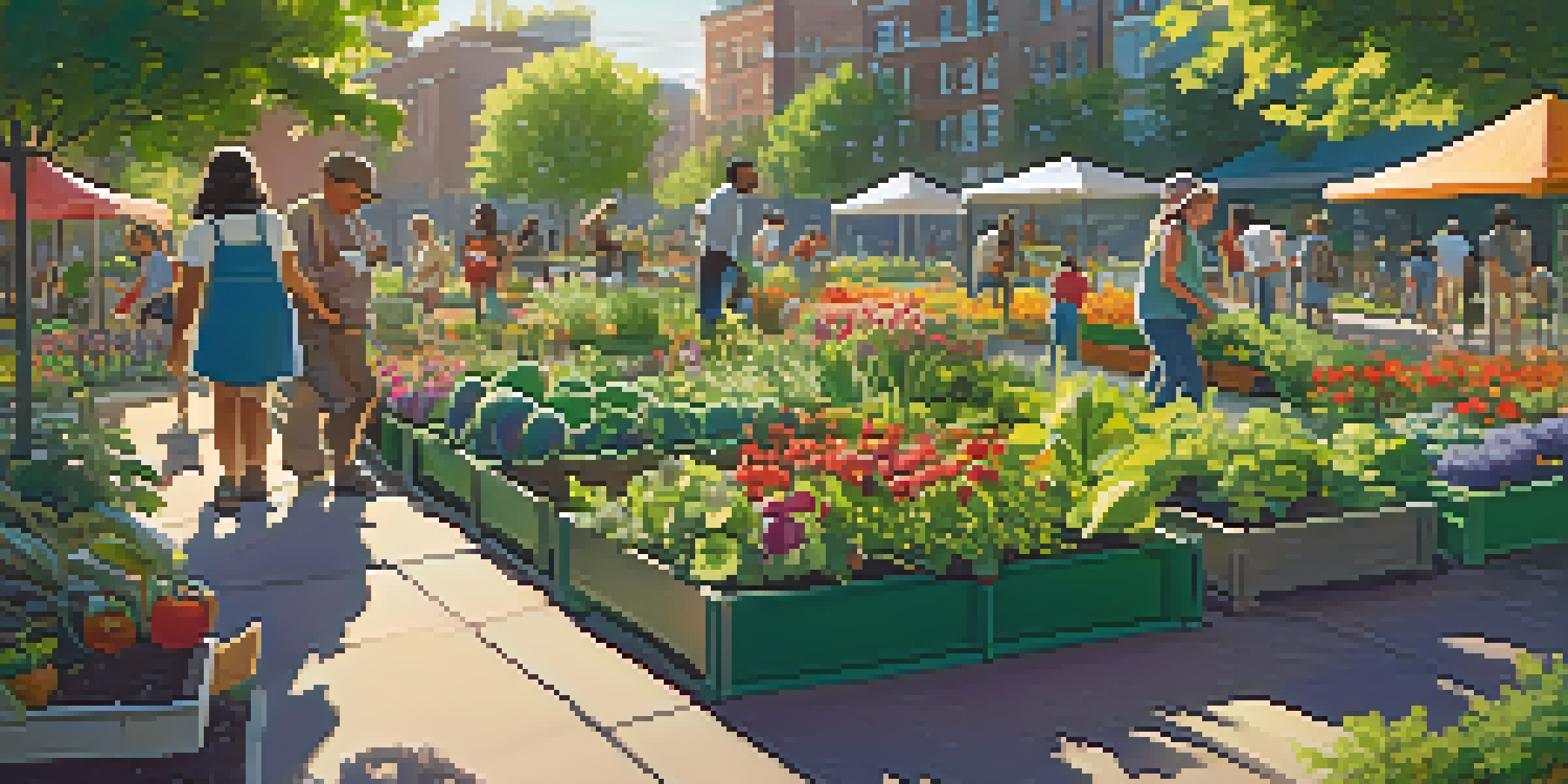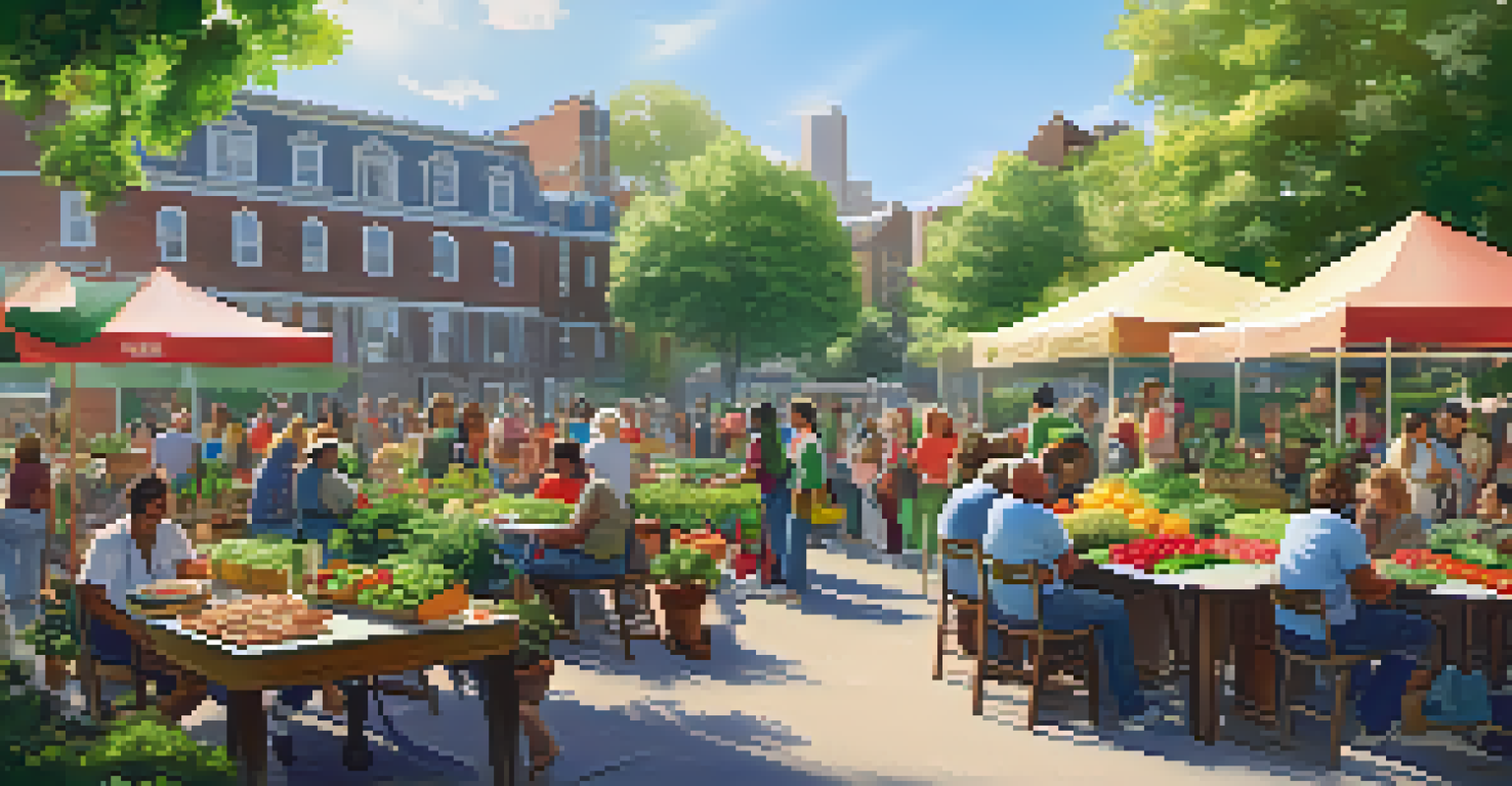Community Gardening: A Solution for Urban Mental Health Issues

Understanding Urban Mental Health Challenges
Urban living can often feel isolating, with fast-paced lifestyles and crowded spaces contributing to mental health issues. Many city dwellers report feelings of anxiety, depression, and loneliness as they navigate their daily lives. The constant hustle and bustle can create a disconnect from nature and community, exacerbating these feelings.
Gardening adds years to your life and life to your years.
Research shows that mental health disorders are on the rise in urban areas, highlighting a critical need for effective solutions. Factors such as noise, pollution, and lack of green spaces directly impact our well-being. In this context, community gardening emerges as a potential remedy, offering both social interaction and a connection to nature.
By fostering a sense of belonging and purpose, community gardens can help combat the adverse effects of urban living. They provide a space where individuals can engage with others, share experiences, and cultivate not just plants but relationships, thus addressing the roots of urban mental health challenges.
The Therapeutic Benefits of Gardening
Gardening has long been recognized for its therapeutic properties, acting as a natural stress reliever. Engaging with the earth, planting seeds, and watching them grow can provide a sense of achievement and joy. This hands-on activity encourages mindfulness, allowing individuals to focus on the present moment and escape the pressures of daily life.

Studies have indicated that gardening can lower cortisol levels, the hormone associated with stress, and enhance overall mood. The physical activity involved also releases endorphins, which contribute to feelings of happiness and well-being. In community gardens, these benefits are magnified as people work together, share knowledge, and celebrate their collective achievements.
Urban Gardens Boost Mental Health
Community gardening provides social connection and a sense of belonging, helping to alleviate feelings of anxiety and loneliness in urban environments.
Moreover, the act of nurturing plants can mirror personal growth, fostering resilience and purpose. Participants often report increased self-esteem and improved emotional regulation, reinforcing the idea that community gardening serves as a powerful mental health tool within urban settings.
Building Community Connections through Gardening
Community gardening is not just about growing food; it’s about cultivating relationships. These gardens serve as gathering spaces where individuals from diverse backgrounds come together with a shared goal. As neighbors collaborate, they build trust and establish friendships, creating a support network that can combat feelings of isolation.
The best time to plant a tree was 20 years ago. The second best time is now.
Participating in a community garden allows individuals to engage in meaningful conversations and share experiences, fostering a sense of belonging. This social interaction is crucial in urban areas, where anonymity can lead to loneliness. By working side by side, community members develop a collective identity and pride in their shared space.
As these connections deepen, community gardens can transform into hubs of social activity and inclusion. Events such as potlucks, workshops, and festivals further strengthen bonds, making the garden a vibrant part of the neighborhood and enhancing the overall mental health of its members.
Promoting Access to Fresh Produce
In many urban areas, access to fresh produce is limited, leading to food deserts where residents struggle to find healthy options. Community gardens can help bridge this gap, providing a source of fresh fruits and vegetables for local residents. This not only contributes to better physical health but also positively impacts mental well-being.
Eating a balanced diet rich in fruits and vegetables has been linked to improved mood and cognitive function. Community gardening encourages healthier eating habits, as participants become more invested in the food they grow and consume. This connection to food can foster a sense of accomplishment and pride in one’s health.
Gardening Enhances Emotional Well-Being
Engaging in gardening activities lowers stress levels and promotes mindfulness, leading to improved mood and emotional regulation.
Additionally, sharing the harvest among garden members promotes generosity and community spirit. It reinforces the idea that well-being is interconnected, as individuals work together to support one another’s health and nutrition, further enhancing the mental health benefits of gardening.
Sustainability and Environmental Awareness
Engaging in community gardening also raises awareness about sustainability and environmental stewardship. Participants learn about eco-friendly practices such as composting, crop rotation, and organic gardening, which foster a deeper appreciation for the environment. This knowledge empowers individuals to make more sustainable choices in their everyday lives.
As community gardens thrive, they contribute to urban biodiversity, providing habitats for various species and improving air quality. This connection to nature can have profound effects on mental health, as interactions with green spaces are known to reduce stress and promote relaxation. The more we nurture our environment, the more it nurtures us in return.
By cultivating a love for the earth, community gardening encourages individuals to take pride in their surroundings and advocate for greener practices in their neighborhoods. This sense of purpose and responsibility can positively impact mental health, as people feel engaged and connected to both their community and the planet.
Case Studies: Successful Community Gardening Initiatives
Across the globe, numerous community gardening initiatives have showcased the positive impact on urban mental health. For instance, the 'Guerilla Gardening' movement has transformed neglected spaces into flourishing gardens, bringing joy and greenery to urban settings. These grassroots efforts often spark community involvement and revitalization, proving that even small changes can yield significant mental health benefits.
In cities like Detroit, community gardens have become vital resources for residents seeking fresh produce and social interaction. They have not only improved access to food but also fostered resilience in neighborhoods facing economic challenges. The stories of individuals finding hope and purpose through gardening highlight the transformative power of these initiatives.
Access to Fresh Food Supports Health
Community gardens address food deserts by providing fresh produce, which contributes to better physical and mental health for urban residents.
Such examples illustrate that community gardening is more than just a trend; it’s a movement towards healthier urban living. As more cities embrace this concept, we can expect to see a ripple effect of improved mental health and community cohesion.
Getting Involved: How to Start a Community Garden
Starting a community garden may seem daunting, but it can be a rewarding experience for all involved. The first step is to gather interested individuals and discuss potential locations, such as vacant lots or parks. Collaborating with local organizations can provide resources and support, ensuring the garden's success from the outset.
Next, it's important to create a plan that outlines the garden's goals, the types of plants to grow, and how to manage shared responsibilities. Engaging the community in this planning process can foster a sense of ownership and commitment. Additionally, hosting workshops and events can help educate members about gardening techniques and sustainability practices.

Finally, promote the garden through social media, local events, and word of mouth to attract participants. The more inclusive and welcoming the garden is, the more likely it is to thrive and provide a valuable resource for mental health and community bonding.